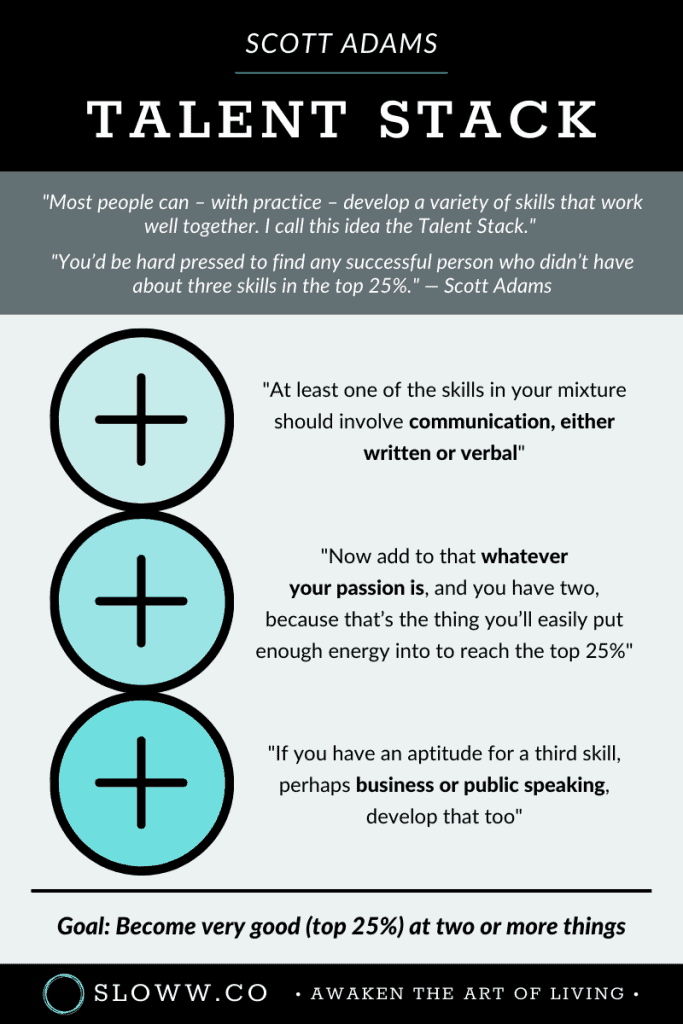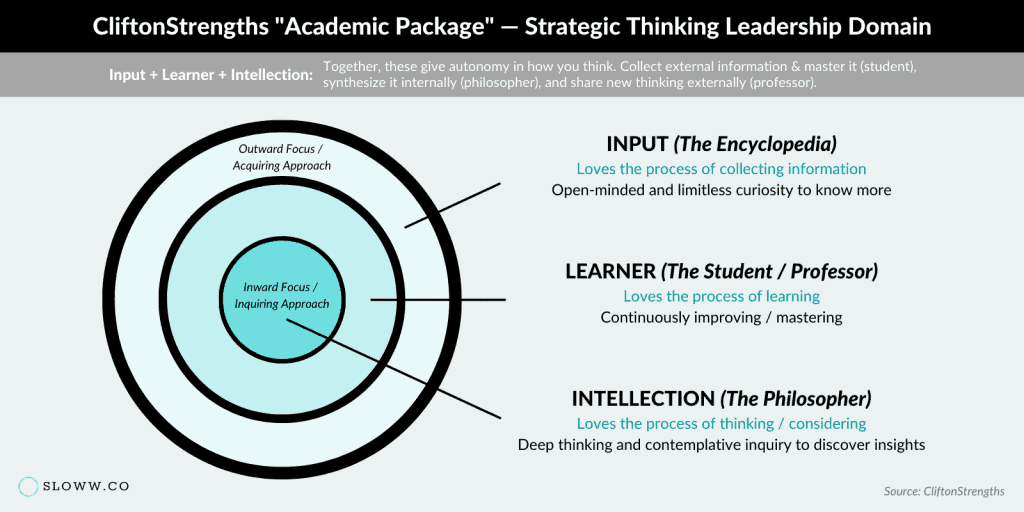What is a talent stack?
I recently listened to (and summarized) the Naval Ravikant podcast “How to Get Rich.”
Scott Adams, creator of Dilbert, gets several shout-outs during the podcast. One thing that intrigued me was his concept of a “talent stack.”
After doing some research on it, here’s everything I learned—along with how I’m thinking about my own unique stack.
“It frequently takes half a lifetime for the creatively talented individual to come to terms with one’s own talent, to accept it fully, and to unleash oneself, that is, to be postambivalent about one’s talent.” — Abraham Maslow

What is a Talent Stack? (& How I’m Thinking about My Unique Stack)
The Talent Stack by Scott Adams
In his own words, Scott Adams says:
- “Most people can – with practice – develop a variety of skills that work well together. I call this idea the Talent Stack.”
Here’s a short video introducing the concept:
Scott says there are two paths to extraordinary:
- Become the best at one specific thing.
- Become very good (top 25%) at two or more things.
Can you guess which path is the way to go?
- “The first strategy is difficult to the point of near impossibility. Few people will ever play in the NBA or make a platinum album. I don’t recommend anyone even try. The second strategy is fairly easy. Everyone has at least a few areas in which they could be in the top 25% with some effort.”
Scott’s unique talent stack includes: drawing + writing + business skills + work ethic + risk tolerance + sense of humor:
- “For example, I’m a famous syndicated cartoonist who doesn’t have much artistic talent, and I’ve never taken a college-level writing class. But few people are good at both drawing and writing. When you add in my ordinary business skills, my strong work ethic, my risk tolerance, and my reasonably good sense of humor, I’m fairly unique.”
- “In my case, I can draw better than most people, but I’m hardly an artist. And I’m not any funnier than the average standup comedian who never makes it big, but I’m funnier than most people. The magic is that few people can draw well and write jokes. It’s the combination of the two that makes what I do so rare. And when you add in my business background, suddenly I had a topic that few cartoonists could hope to understand without living it.”
What if you want to commercialize what you do?
- “Capitalism rewards things that are both rare and valuable. You make yourself rare by combining two or more ‘pretty goods’ until no one else has your mix.”
- “In this case (my) uniqueness has commercial value.”
If we look at Scott Adams holistically, we could separate his talents and skills into two types (this is my own language):
- 1) Cornerstone — Your leading talents that form the foundation for everything else to be built upon
- 2) Commercialize — Talents/skills that turn your unique cornerstone mix into money
We could almost turn it into an equation like this:
Scott Adams Unique Talent Stack:
Cornerstone: Top 25% Drawing + Top 25% Writing w/ Sense of Humor
Commercialize: Business Skills + Work Ethic + Risk Tolerance
A couple similar combination ideas from others:
Scott Adams isn’t the only one talking about something in this realm. Virtually everything is a remix of things that came before it—from ideas to inventions to innovations. Some refer to this as combinatorial creativity.
I believe Matt Ridley came up with the concept of “idea sex,” but it’s been popularized by James Altucher over the last decade:
- “Combine two ideas to come up with a better idea. Don’t forget that idea evolution works much faster than human evolution. You will always come up with better ideas after generations of idea sex. This is the DNA of all idea generation.” — James Altucher
- “Take two things. Take three. Combine them. Now you are the best in the world at the intersection.” — James Altucher
Altucher mentions Stanley Weston, creator of the concept of “action figures” and G.I. Joe toys:
- “Truly groundbreaking ideas are rare, but you don’t necessarily need one to make a career out of creativity. My definition of creativity is the logical combination of two or more existing elements that result in a new concept.” — Stanley Weston
Create your own Unique Talent Stack

Scott Adams believes anyone can create a talent stack:
- “The takeaway here is that anyone can develop a more valuable talent stack. Just figure out which talents go well together.”
So, I figured I’d put myself to the test. Here’s how he says to start finding your own:
- “At least one of the skills in your mixture should involve communication, either written or verbal … Now add to that whatever your passion is, and you have two, because that’s the thing you’ll easily put enough energy into to reach the top 25%. If you have an aptitude for a third skill, perhaps business or public speaking, develop that too. It sounds like generic advice, but you’d be hard pressed to find any successful person who didn’t have about three skills in the top 25%.”
Naval Ravikant builds on Scott’s advice. He sums it up by saying “learn to sell, learn to build.” Interestingly, this could be seen as the same as: cornerstone (“learn to build”) and commercialize (“learn to sell”). Naval also recommends these top skills:
- Reading
- Writing
- Arithmetic
- Persuasion (which is talking)
- Computer Programming (an applied form of arithmetic that just gets you so much leverage for free in any domain that you operate in)
When we combine Ravikant and Adams, we get a starting template to consider:
- Passion(s)
- Reading
- Writing
- Talking (Persuasion / Public speaking)
- Arithmetic
- Business
- Other (e.g. Computer Programming)
My Personal “Unique Stack”
The first thing I want to note here is that technically “talent” isn’t synonymous with “strength” or “skill.” To me, it seems like skills may actually be a byproduct of what you love + your talents. For instance, if you are “made for” something (talent), you may enjoy spending time on it (love/passion), and eventually become good at something (skill).
However, I’m not sure the distinction between terms really matters in this case when the goal is to stack everything together into a unique combination. So, I’ve removed the word “talent” and combined many aspects of myself into my own “unique stack” which considers: personality, talents, strengths, skills, and more.
Reflecting on Past Self / Selves
I started by seeing if there’s anything I could learn and leverage from my past self / selves:
- Design: I grew up in highly creative immediate and extended families and was heavily involved in design through high school (almost pursuing graphic design in college). I learned many design fundamentals and seem to have carried “an eye for design” and attention to detail since then.
- Work Ethic: I grew up in organized sports and got good grades. I attribute much of my “success” in anything I’ve ever done (school, sports, work) to my work ethic. I even had one boss tell me that my 80% is everyone else’s 120%.
- Marketing: If I look at the bright side of my marketing career, I have a decade of real-world experience in branding, digital marketing, and advertising that I’m able to actively leverage into what I do now. Specifically within digital marketing, I worked in account management, project management, social media, digital insights, digital strategy, and multichannel marketing. Since venturing out on my own, I’ve started teaching myself SEO and email.
Self-Assessments
Over the years, I’ve done a bunch of self-assessments through various jobs and on my own. Some of these include:
- MBTI Personality Type: INTJ (consistently typed between 2017-2020)
- Enneagram: Some combo of Types 5 & 3 with a dash of 1 (2019)
- DiSC Classical Pattern: Objective Thinker (2015)
- Imperative Personal Purpose Profile: Inquirer—”to enable society to overcome societal barriers by finding answers and increasing their knowledge” (2018)
- CliftonStrengths / StrengthsFinder: Input, Intellection, Achiever, Learner, Maximizer (2020) / Achiever, Learner, Maximizer, Responsibility, Input (2012)
CliftonStrengths (from Gallup)
This one is particularly interesting to me because my results were so consistent over the course of almost a decade at various jobs (between my mid-20s and mid-30s). When you take CliftonStrengths (previously called StrengthsFinder), you get a report that includes your five most dominant themes of talent (mine are in rank order listed above). The idea is that focusing on these five—separately and in combination—can lead to success.
The combination of “Input + Intellection + Learner” is what Curt Liesveld (one of Gallup’s most experienced coaches and educators) called the “Academic Package.” All three are in the “Strategic Thinking Leadership Domain,” and together these give autonomy in how you think. In a way, you are simultaneously the student, philosopher, and professor—collecting external information & mastering (student), synthesizing it internally (philosopher), and sharing new thinking externally (professor).
It’s also been described as a bullseye where each of the strengths is more focused than the last:

Individually, here’s a bit about each:
Input (The Encyclopedia):
- Loves the process of collecting information
- Open-minded and limitless curiosity to know more
Learner (The Student / Professor):
- Loves the process of learning
- Continuously improving / mastering
Intellection (The Philosopher):
- Loves the process of thinking / considering
- Deep thinking and contemplative inquiry (doing the hard think work) to discover insights that lead to new perspective and personal development
My other two top themes outside of the “academic package” include:
Achiever:
- Self-motivated with an internal fire burning inside
- Feel as if every day starts at zero—by the end of the day you must achieve something tangible (driven to complete)
Maximizer:
- Seek to transform something from strong to superb
- Strengths fascinate you—having found a strength, you feel compelled to nurture it, refine it, and stretch it toward excellence
Colleague Feedback
Since self-bias is always a possibility, I wanted to perform some “checks & balances” on myself by cross-referencing feedback I’ve received from others. I went back and revisited feedback from LinkedIn recommendations and old performance reviews to see if it matched my own self-assessments. I’ve attempted to sort colleague feedback by theme.
- Input: “great capacity for absorbing complex information and distilling it to find value”; “passion for research and process organization”; “extremely astute at researching”; “expansive knowledge”; “I learned something new from him on a daily basis”; “always on the lookout for new and interesting tidbits to share”
- Learner: “favorite quality is his appetite to learn and grow—a true ‘student of the game'”; “constantly willing and wanting to continue his education on a variety of subjects—through books, people, webinars, etc”; “makes a point to educate himself”; “his knowledge is irreplaceable and he has a true passion for learning more each day”
- Intellection: “a rare talent—an uncanny ability to understand how the smallest details support the larger strategy”; “looking at the big picture to understand the objectives”; “consistently kept the end goal top of mind”; “incredibly smart”; “excellent strategist”; “delivered great insights”; “consistently provided great insights and recommendations”
- Achiever: “willing to put forth the effort required to complete difficult or challenging tasks”; “incredible work ethic”; “incredibly diligent, thorough and hard-working”; “unwavering dedication and focus”; “always did what it took to get the job done and exceed expectations”
- Maximizer: “passion for delivering high quality work”; “goes above and beyond each and every time”; “work is consistently stellar”; “commitment to world-class work”; “one of my go-to people”; “outshined his peers”; “his skillset goes far beyond his specialty”
So, what’s my unique stack?
There’s one more thing that needs to be mentioned: the fuel for my stack.
What is the passion that drives the flywheel effect of my unique stack?
My existential crisis from a lack of purpose provided a key ingredient in what I do now—finding purpose and sharing what I learn to help others find purpose. My crisis triggered the topic: purpose (a sub-topic of an infinite subject which is the art of living).
I’ve had most of my unique stack for many years, but my crisis was the spark needed to fully activate it for the greater good of myself and others. If you frame it in terms of problem solving, the problems I try to solve for myself and others are: how to find purpose and how to live fully alive.
Here’s how I envision it when you put it all together:
My Unique Stack: “Synthesizing Solopreneur”
Passion: Art of Living (Purpose + Wisdom + Human Potential)
Cornerstone: Reading + Strategic Thinking (Input + Learner + Intellection) + Writing
Commercialize: Business Acumen + Digital Marketing + Work Ethic
Untapped Potential: Design
What do you think? Did anything stand out or spark an idea for your own unique stack?
Please let me know in the comments.
You May Also Enjoy:




